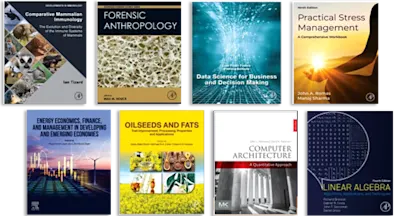
Research Methods
Information, Systems, and Contexts
- 2nd Edition - November 27, 2017
- Imprint: Chandos Publishing
- Editors: Kirsty Williamson, Graeme Johanson
- Language: English
- Paperback ISBN:9 7 8 - 0 - 0 8 - 1 0 2 2 2 0 - 7
- eBook ISBN:9 7 8 - 0 - 0 8 - 1 0 2 2 2 1 - 4
Research Methods: Information, Systems, and Contexts, Second Edition, presents up-to-date guidance on how to teach research methods to graduate students and professionals working i… Read more
Purchase options

Research Methods: Information, Systems, and Contexts, Second Edition, presents up-to-date guidance on how to teach research methods to graduate students and professionals working in information management, information science, librarianship, archives, and records and information systems. It provides a coherent and precise account of current research themes and structures, giving students guidance, appreciation of the scope of research paradigms, and the consequences of specific courses of action. Each of these valuable sections will help users determine the relevance of particular approaches to their own questions. The book presents academics who teach research and information professionals who carry out research with new resources and guidance on lesser-known research paradigms.
- Provides up-to-date knowledge of research methods and their applications
- Provides a coherent and precise account of current research themes and structures through chapters written by authors who are experts in their fields
- Helps students and researchers understand the range of quantitative and qualitative approaches available for research, as well as how to make practical use of them
- Provides many illustrations from projects in which authors have been involved, to enhance understanding
- Emphasises the nexus between formulation of research question and choice of research methodology
- Enables new researchers to understand the implications of their planning decisions
Research students, researchers, academics involved in teaching research, information professionals in higher education, research, and corporate libraries working alongside researchers, or carrying out independent research
Section I Foundations and Framing
1. Research concepts
Kirsty Williamson
2. The fundamentals of research planning
Kirsty Williamson
3. Information research: Patterns and practice
Graeme Johanson and Kirsty Williamson
4. Archival and recordkeeping research: Past, present and future
Anne J. Gilliland and Sue Mckemmish
5. The methodological landscape: Information systems and knowledge management
Dubravka Cecez-Kecmanovic and Mary Anne Kennan
Section II Research Methods
6. Survey designs
Kerry Tanne
7. Case study research in information systems
Graeme Shanks and Nargiza Bekmamedova
8. Action research: Theory and practice
Kirsty Williamson
9. Constructivist grounded theory: A 21st century research methodology
James E. Herring
10. Bibliometric research
Gaby Haddow
11. Design-science research
Ron Weber
12. Researching history
Graeme Johanson
13. Ethnographic research
Kirsty Williamson
14. Experimental research
Kerry Tanner
Section III Research Techniques
15. Populations and samples
Kirsty Williamson
16. Questionnaires, individual interviews and focus group interviews
Kirsty Williamson
17. Observation
Kirsty Williamson
18. Quantitative data analysis
Judy Sheard
19. Qualitative data analysis
Kirsty Williamson, Lisa M. Given and Paul Scifleet
Section IV Research Practice and Communication
20. Ethical research practices
Graeme Johanson
21. Managing research data
Mary Anne Kennan
22. Research writing and dissemination
Mary Anne Kennan and Kim M. Thompson
Section V Information Research: Reflections on Past and Future
23. The future of information research
Kirsty Williamson, Graeme Johanson, Alex Byrne, Lisa M. Given, Mary Anne Kennan and Gillian Oliver
- Edition: 2
- Published: November 27, 2017
- Imprint: Chandos Publishing
- Language: English
KW
Kirsty Williamson
GJ